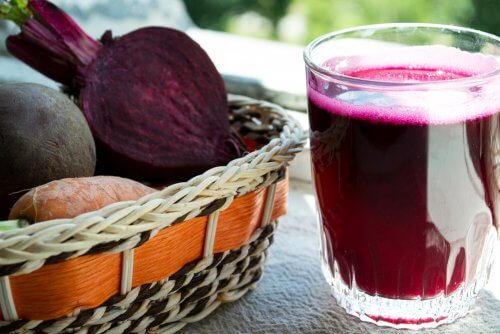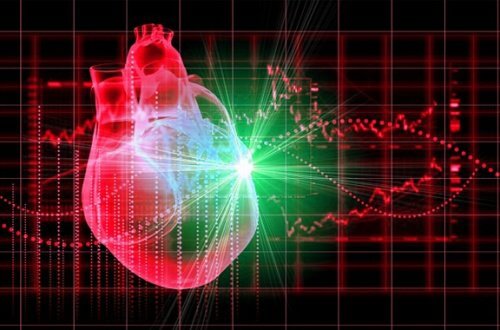7 Benefits of Eating Beets

Beets are usually used in salads, soups, smoothies, and pickles. They’re even used as a natural dye. Despite the fact that this is a food that’s available all year long, there are some people who don’t eat them very much. To try and put things right, in today’s post we’ll be telling you all about the benefits of eating beets.
Eating beets helps you reach your goal of getting vitamins, minerals, and organic compounds you need for your day to day life. Plus, they’re low in calories and don’t have cholesterol.
Here are the 7 biggest benefits of eating beets:
1. The benefits of eating beets to improve your heart health

First of all, the fiber in beets helps to reduce bad cholesterol and triglycerides. At the same time, it increases the good cholesterol in your body.
This reduces the risk of problems related to your heart.
Plus, the betaine present in beets helps to reduce the levels of homocysteine. Homocysteine is a chemical that is harmful for your blood vessels.
As a result, eating this vegetable helps you prevent cardiovascular diseases in many ways. These diseases include arteriosclerosis, heart attacks, and strokes.
2. They help prevent certain kinds of cancer
Another of the benefits of eating beets is that they can help your body prevent skin, lung, and colon cancer, as long as you eat them on a regular basis. This is because this root has a pigment called betacyanins. This pigment is capable of fighting the growth of cancerous cells.
Add beets to your foods or as a juice 2 or 3 times per week. Doing this inhibits cell mutation and slows the growth of certain tumors.
3. They strengthen your immune system
In addition, beets are a very rich source of vitamin C. This vitamin is a big help for preventing symptoms of asthma. Plus, it’s also a powerful antioxidant.
This means that they stimulate your immune system. Plus, they also increase your white blood cell activity.
Are you constantly sick? If so, it’s likely that your body isn’t prepared to fight and defeat viruses, bacteria, fungus, and toxins in your environment.
Beets can help!
4. They help reduce eye problems
Beets have beta-carotene. This prevents blindness caused by macular damage. It also reduces the chances of suffering from cataracts.
Although these two problems are very common as you age, you don’t have to resign yourself to suffering from them. If you already have eye problems, know that you still have time to slow their advance.
Besides following your doctor’s orders, add this drink to your diet at least once per week:
Ingredients
- The juice of 1 large orange, or 2 small ones
- 1 small beet
- 2 carrots
Instructions
Put everything in the blender and blend it until you get a smooth drink. Then, drink it immediately. This prevents the loss of its properties.
5. They have aphrodisiac properties

Eating beets works as a sexual strengthener or an aphrodisiac. This effect is due to its high levels of boron. This element has been shown to greatly increase sexual hormones.
This helps you to:
- Increase your libido
- Improve your fertility
- Increase the mobility of your sperm cells
If you and your partner are looking to get pregnant and you haven’t been able to, be sure to try eating beets more often.
See also: 5 Medicinal Plants that May Help Increase Sex Drive
6. They increase your energy levels
Beets have a large amount of healthy carbohydrates. The days you need more energy, you should think about using this root instead of energy drinks or processed foods.
Your body is able to give energy to all of its necessary functions so they work correctly. However, it only does this when it has enough carbohydrates.
Your body will also absorb oxygen better. This will help you breathe when you exercise.
If you have a craving for something crunchy before going on a run, try eating some beet chips. These are also great for satisfying a craving for a snack before a movie without giving you any extra calories.
7. They help prevent strokes

Potassium is very important due to the fact that it’s a vasodilator. This means that it helps your blood vessels relax and reduces your blood pressure, thereby helping to reduce blood clots.
Read more: Blood Clots: Watch Out for These 8 Signs
However, don’t eat too many beets
Despite these 7 benefits that you get from eating beets, it’s very important that you don’t eat too much. This vegetable has oxalates. These are elements that can clot certain body fluids.
You shouldn’t eat beets if you have kidney or gall bladder problems, either.
All cited sources were thoroughly reviewed by our team to ensure their quality, reliability, currency, and validity. The bibliography of this article was considered reliable and of academic or scientific accuracy.
- American Society of Hematology. (s.f.). Anemia and pregnancy. Consultado el 1 de julio de 2024. https://www.hematology.org/education/patients/anemia/pregnancy
- Arruda Ramos, J., Aparecida Furlaneto, K., Mendonça, V., & Aparecida de Carvalho Flávia, M. N. (2017). Influence of cooking methods on bioactive compounds in beetroot. Semina: Ciencias Agrarias, 38(3), 1295-1301. https://www.researchgate.net/publication/318034638_Influence_of_cooking_methods_on_bioactive_compounds_in_beetroot
- Benjamin, C. J. R., Porto, A. A., Valenti, V. E., da Silva Sobrinho, A. C., Garner, D. M., Gualano, B., & Bueno Júnio, C. R. (2022). Nitrate derived from beetroot juice lowers blood pressure in patients with arterial hypertension: a systematic review and meta-analysis. Frontiers in Nutrition, 9, 1-11. https://www.ncbi.nlm.nih.gov/pmc/articles/PMC8965354/
- British Heart Foundation. (19 de enero de 2015). Beetroot juice lowers high blood pressure. https://www.bhf.org.uk/what-we-do/news-from-the-bhf/news-archive/2015/january/beetroot-and-blood-pressure
- Domínguez, R., Cuenca, E., Maté-Muñoz, J. L., García-Fernández, P., Serra-Paya, N., Lozano Estevan, M. C., Veiga Herreros, P., & Garnacho-Castaño, M. V. (2017). Effects of beetroot juice supplementation on cardiorespiratory endurance in athletes. A systematic review. Nutrients, 9(1), 1-18. https://www.mdpi.com/2072-6643/9/1/43
- Fuentes-Barría, H., Muñoz Peña, D., Aguilera Eguía, R., & González Wong, C. (2018). Influencia de los compuestos bioactivos de betarraga (Beta vulgaris L) sobre el efecto cardio-protector: Una revisión narrativa. Revista Chilena de Nutrición, 45(2), 178-182. https://www.scielo.cl/scielo.php?script=sci_arttext&pid=S0717-75182018000300178
- Jones, A. M., Thompson, Ch., Wylie, L. J., & Vanhataloo, A. (2018). Nitrate and physical performance. Annual Review of Nutrition, 38, 303-328. https://www.annualreviews.org/content/journals/10.1146/annurev-nutr-082117-051622
- Mayo Clinic. (10 de agosto de 2023). El folato (ácido fólico). Consultado el 1 de julio de 2024. https://www.mayoclinic.org/es/drugs-supplements-folate/art-20364625
- Mayo Clinic. (4 de noviembre de 2022). Fibra alimentaria: esencial para una alimentación saludable. Consultado el 1 de julio de 2024. https://www.mayoclinic.org/es/healthy-lifestyle/nutrition-and-healthy-eating/in-depth/fiber/art-20043983
- National Heart, Lung and Blood Institute. (24 de marzo de 2022). Anemia por deficiencia de hierro. Consultado el 1 de julio de 2024. https://www.nhlbi.nih.gov/es/salud/anemia/anemia-ferropenica
- Percy, L. (9 de junio de 2022). Daily beetroot juice could help people with common heart condition. British Heart Foundation. https://www.bhf.org.uk/what-we-do/news-from-the-bhf/news-archive/2022/june/daily-beetroot-juice-could-help-people-with-common-heart-condition
- Pinna, M., Roberto, S., Milia, R., Marongiu, E., Olla, S., Loi, A., Migliaccio, G. M., Padulo, J., Orlandi, C., Tocco, F., Concu, A., & Crisafulli, A. (2014). Effect of beetroot juice supplementation on aerobic response during swimming. Nutrients, 6(2), 605-615. https://www.mdpi.com/2072-6643/6/2/605
- Science Daily. (2 de noviembre de 2010). Daily dose of beet juice promotes brain health in older adults. https://www.sciencedaily.com/releases/2010/11/101102130957.htm
- Sentkowska, A., & Pyrzynska, K. (2023). Fashioned, but still a superfood – red beets as a rich source of bioactive compounds. Applied Sciences, 13(13), 1-16. https://www.mdpi.com/2076-3417/13/13/7445
- Sight Research U. K. (s.f.). Beetroot for eye health. Consultado el 1 de julio de 2024. https://www.sightresearchuk.org/nutrition/beetroot-good-for-your-eyes/
- Szymanski, J., Szwajgier, D., & Baranowska-Wójcik, E. (2023). The role of beetroot ingredients in the prevention of Alzheimer’s disease. Applied Sciences, 13(2), 1-15. https://www.mdpi.com/2076-3417/13/2/1044
This text is provided for informational purposes only and does not replace consultation with a professional. If in doubt, consult your specialist.








